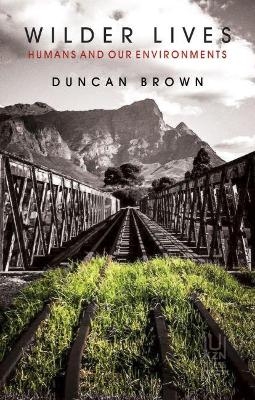
Wilder Lives
Humans and Our Environments
Seiten
2019
University of KwaZulu-Natal Press (Verlag)
978-1-86914-421-0 (ISBN)
University of KwaZulu-Natal Press (Verlag)
978-1-86914-421-0 (ISBN)
Uses ideas of “wildness” and “rewilding” to rethink human relationships with our environments in challenging but affirming ways. Brown's argument is wide-ranging, taking us through such questions as wildness and conservation, wild cities, rewilding language, wildness and food, wild margins, and wildness in the ethics of human-animal relations.
Wilder Lives uses ideas of `wildness’ and `rewilding’ to rethink human relationships with our environments in challenging but affirming ways. If the Earth is indeed 4.5 billion years old, as scientists currently tell us, recognisably human life has only been around since the last Ice Age, and as a species we have single-handedly destroyed our planet’s ecosystems in the short space of a few hundred years, then we urgently need to reconsider and redefine our identities and behaviours. Can `thinking wild’ help? Can it provide different ways of seeing, engaging, being human? Can we think of `wildness’ as something that may exist in gradations, or as quality rather than absolute value, and as something that has important ethical as well as biological dimensions? Can it lead us to a `world view locating humans in a satisfactory residence on this historic and storied Earth’, as Holmes Rolston (1988) suggests?
Brown’s argument in this book is wide-ranging, inquiring, challenging, but finally inspiring, and takes us through such questions as wildness and conservation, wild cities, rewilding language, wildness and food, wild animals, wild margins, and wildness in the ethics of human-animal relations.
Wilder Lives uses ideas of `wildness’ and `rewilding’ to rethink human relationships with our environments in challenging but affirming ways. If the Earth is indeed 4.5 billion years old, as scientists currently tell us, recognisably human life has only been around since the last Ice Age, and as a species we have single-handedly destroyed our planet’s ecosystems in the short space of a few hundred years, then we urgently need to reconsider and redefine our identities and behaviours. Can `thinking wild’ help? Can it provide different ways of seeing, engaging, being human? Can we think of `wildness’ as something that may exist in gradations, or as quality rather than absolute value, and as something that has important ethical as well as biological dimensions? Can it lead us to a `world view locating humans in a satisfactory residence on this historic and storied Earth’, as Holmes Rolston (1988) suggests?
Brown’s argument in this book is wide-ranging, inquiring, challenging, but finally inspiring, and takes us through such questions as wildness and conservation, wild cities, rewilding language, wildness and food, wild animals, wild margins, and wildness in the ethics of human-animal relations.
Duncan Brown is dean of the Faculty of Arts and professor of English at the University of the Western Cape. He has published widely in the field of South African literary and cultural studies, and more recently in the field of environmental studies. He is a fellow of the University of KwaZulu-Natal and a fellow of the Stellenbosch Institute for Advanced Study.
| Erscheinungsdatum | 01.04.2019 |
|---|---|
| Verlagsort | Scottsville, Kwazulu-Natal |
| Sprache | englisch |
| Maße | 140 x 220 mm |
| Gewicht | 500 g |
| Themenwelt | Naturwissenschaften ► Biologie ► Ökologie / Naturschutz |
| Sozialwissenschaften ► Soziologie ► Empirische Sozialforschung | |
| ISBN-10 | 1-86914-421-X / 186914421X |
| ISBN-13 | 978-1-86914-421-0 / 9781869144210 |
| Zustand | Neuware |
| Haben Sie eine Frage zum Produkt? |
Mehr entdecken
aus dem Bereich
aus dem Bereich
Lehrbuch zu Grundlagen, Technologie und Praxis
Buch | Hardcover (2022)
Hanser (Verlag)
34,99 €


